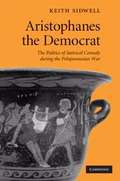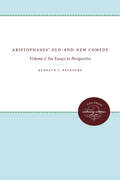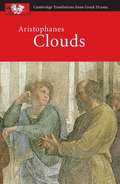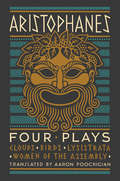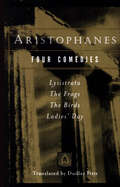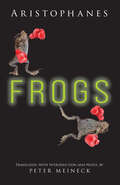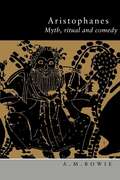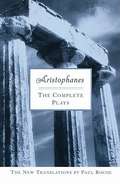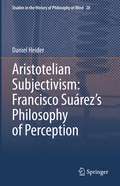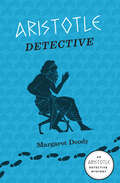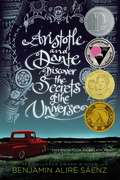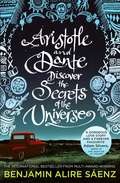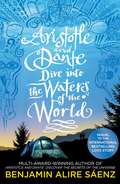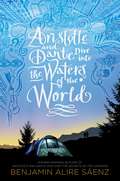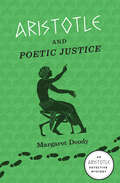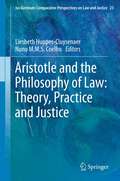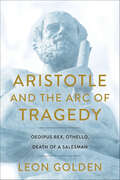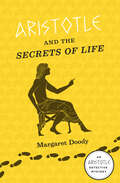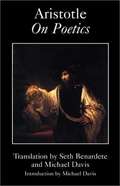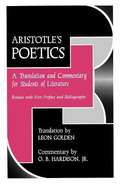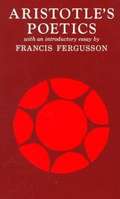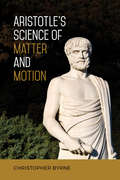- Table View
- List View
Aristophanes and the Poetics of Competition
by Zachary P. BilesAthenian comic drama was written for performance at festivals honouring the god Dionysos. Through dramatic action and open discourse, poets sought to engage their rivals and impress the audience, all in an effort to obtain victory in the competitions. This book uses that competitive performance context as an interpretive framework within which to understand the thematic interests shaping the plots and poetic quality of Aristophanes' plays in particular, and of Old Comedy in general. Studying five individual plays from the Aristophanic corpus as well as fragments of other comic poets, it reveals the competitive poetics distinctive to each. It also traces thematic connections with other poetic traditions, especially epic, lyric, and tragedy, and thereby seeks to place competitive poetics within broader trends in Greek literature.
Aristophanes the Democrat: The Politics of Satirical Comedy During the Peloponnesian War
by Keith SidwellThis book provides a new interpretation of the nature of Old Comedy and its place at the heart of Athenian democratic politics. Professor Sidwell argues that Aristophanes and his rivals belonged to opposing political groups, each with their own political agenda. Through disguised caricature and parody of their rivals' work, the poets expressed and fuelled the political conflict between their factions. Professor Sidwell rereads the principal texts of Aristophanes and the fragmented remains of the work of his rivals in the light of these arguments for the political foundations of the genre.
Aristophanes' Old-and-New Comedy: Volume I: Six Essays in Perspective
by Kenneth J. ReckfordThis startling and original study emerged from Kenneth Rockford's wish to vindicate Aristophanes' Clouds against detractors. As a result of years of rereading and teaching Aristophanes, he realized that the Clouds could not be defended in an analysis of that play in isolation. A better approach, he decided, would be to define a comic perspective within which Aristophanes' comedies in general as well as the Clouds in particular could be appreciated.This first volume of Reckford's defense examines the comedies as a whole in a series of defining essays, each with its own dominant concern and method of approach. The author begins by exploring not the usual questions of Aristophanes' political attitudes and his place in the development of comedy, but rather the festive, celebratory, and Dionysian nature of Old Comedy. Here and throughout the book Reckford illustrates Aristophanes' form of comedy with analogies to Rabelais, Shakespeare, Charlie Chaplin, Alice in Wonderland, and The Wonderful Wizard of Oz.In the remaining essays Reckford goes beyond the usual Freudian approaches, reinterpreting the comic catharsis as a clarification of wishing and hoping. He also explores the growth of plays from comic idea to comic performance, in ways reflected in Tom Stoppard's plays today. Only then are Aristophanes' basic political loyalties described, as well as the place of his old- and-new comedy within the history of the genre.In a book that is as much about comedy generally as it is about Aristophanes specifically, some plays are treated more fully than others. Reckford discusses the Wasps at length, comparing the symbolic transformations and comic recognitions in the play with dream experience and dream interpretation. He also analyzes the Peace, the Acharians, the Birds, and the Frogs. Reckford's vindication of the Clouds will appear in the second volume of his defense, Clouds of Glory.Reckford's playful translations preserve the puns and anachronisms of Aristophanes, maintaining the playwright's comic feeling and tone. Combining traditional classical scholarship with a variety of literary, psychological, and anthropological approaches, he has written a study that will appeal to both the academic audience and the general reader who cares about comedy.Originally published in 1987.A UNC Press Enduring Edition -- UNC Press Enduring Editions use the latest in digital technology to make available again books from our distinguished backlist that were previously out of print. These editions are published unaltered from the original, and are presented in affordable paperback formats, bringing readers both historical and cultural value.
Aristophanes' Thesmophoriazusae
by Ashley ClementsAristophanes' comic masterpiece Thesmophoriazusae has long been recognized amongst the plays of Old Comedy for its deconstruction of tragic theatricality. This book reveals that this deconstruction is grounded not simply in Aristophanes' wider engagement with tragic realism. Rather, it demonstrates that from its outset Aristophanes' play draws upon Parmenides' philosophical revelations concerning reality and illusion, employing Eleatic strictures and imagery to philosophize the theatrical situation, criticize Aristophanes' poetic rival Euripides as promulgator of harmful deceptions, expose the dangerous complicity of Athenian theatre audiences in tragic illusion, and articulate political advice to an audience negotiating a period of political turmoil characterized by deception and uncertainty (the months before the oligarchic coup of 411 BC). The book thereby restores Thesmophoriazusae to its proper status as a philosophical comedy and reveals hitherto unrecognized evidence of Aristophanes' political use of Eleatic ideas during the late fifth century BC.
Aristophanes, 2: Wasps, Lysistrata, Frogs, The Sexual Congress (Penn Greek Drama Ser.)
by X. J. Kennedy David R. Slavitt Campbell McGrath Alfred Corn Palmer Bovie R. H. W. DillardThe Penn Greek Drama Series presents original literary translations of the entire corpus of classical Greek drama: tragedies, comedies, and satyr plays. It is the only contemporary series of all the surviving work of Aeschylus, Sophocles, Euripides, Aristophanes, and Menander.
Aristophanes: Clouds
by Aristophanes Judith Affleck John ClaughtonTreating ancient plays as living drama. Classical Greek drama is brought vividly to life in this series of new translations. <P><P>Students are encouraged to engage with the text through detailed commentaries, including suggestions for discussion and analysis. In addition, numerous practical questions stimulate ideas on staging and encourage students to explore the play's dramatic qualities. <P>Clouds is suitable for students of both Classical Civilisation and Drama. Useful features include full synopsis of the play, commentary alongside translation for easy reference and a comprehensive introduction to the Greek Theatre. <P>Clouds is aimed primarily at A-level and undergraduate students in the UK, and college students in North America.<P> Designed for both study and performance, the translations remain faithful to the original Greek, yet have the immediacy of contemporary English.<P> Detailed commentary alongside the translation makes it easy for students to reference and follow, without interrupting their reading of the play.<P> A full synopsis of the play and background information to the story supports students studying a range of plays.<P> A comprehensive introduction to Greek theatre and a guide to the pronunciation of names supports readers and students with no previous knowledge of Greek drama.<P> Activities and suggestions for discussion and analysis allow easy access to the play and enhance reading.<P> Useful notes and questions encourage discussion on the themes and dramatic qualities of the text, and the more practical issues of staging and performance.
Aristophanes: Clouds, Birds, Lysistrata, Women Of The Assembly
by AristophanesCapturing the antic outrageousness and lyrical brilliance of antiquity’s greatest comedies, Aaron Poochigian’s Aristophanes: Four Plays brings these classic dramas to vivid life for a twenty-first century audience. The citizens of ancient Athens enjoyed a freedom of speech as broad as our own. This freedom, parrhesia, the right to say what one pleased, how and when one pleased, and to whom, had no more fervent champion than the brilliant fifth-century comic playwright Aristophanes. His plays, immensely popular with the Athenian public, were frequently crude, even obscene. He ridiculed the great and the good of the city, showing up their hypocrisy and arrogance in ways that went far beyond the standards of good taste, securing the ire (and sometimes the retaliation) of his powerful targets. He showed his contemporaries, and he teaches us now, that when those in power act obscenely, patriotic obscenity is a fitting response. Aristophanes’s satirical masterpieces were also surpassingly virtuosic works of poetry. The metrical variety of his plays has always thrilled readers who can access the original Greek, but until now, English translations have failed to capture their lyrical genius. Aaron Poochigian, the first poet-classicist to tackle these plays in a generation, brings back to life four of Aristophanes’s most entertaining, wickedly crude, and frequently beautiful lyric comedies—the pinnacle of his comic art: · Clouds, a play famous for its caricature of antiquity’s greatest philosopher, Socrates; · Lysistrata, in which a woman convinces her female compatriots to withhold sex from their warmongering lovers unless they negotiate peace; · Birds, in which feathered creatures build a great city and become like gods; · and Women of the Assembly, Aristophones’s most revolutionary play, which inverts the norms of gender and power. Poochigian’s new rendering of these comic masterpieces finally gives contemporary readers a sense of the subversive pleasure Aristophones’s original audiences felt when they were first performed on the Athenian stage.
Aristophanes: Four Comedies
by AristophanesNew English versions of Lysistrata, The Frogs, The Birds, and Ladies' Day. "Thanks to Dudley Fitts...we can appreciate Aristophanes' vigor, his robust style, his scorching wit, his earthy humor, his devotion to honesty and his poetic imagination" (Brooks Atkinson, New York Times). Index.
Aristophanes: Frogs
by AristophanesAristophanes's classic send-up of rivalry within the ultra-competitive world of fifth-century Athenian theatre wins a new lease on life in this fresh line-for-line translation by Peter Meineck. Premiered in 2021 by Aquila Theatre and accompanied here by Meineck&’s notes and wide-ranging Introduction, this Frogs offers the best view yet of a high-stakes afterlife contest between two of Athens's late great playwrights. Both are undisputed masters of tragedy. But only one can win and return to save the city.
Aristophanes: Myth, Ritual and Comedy
by A. M. BowieThis book examines the plays of the Greek comic writer Aristophanes and attempts to reconstruct the responses of the original audiences by using anthropological techniques to compare the plays with those Greek myths and rituals that share similar story patterns or subject matter. It is the first book to apply this type of analysis systematically to all the comedies, and also differs from earlier studies in that it does not impose a single interpretative structure on the plays. All Greek is translated.
Aristophanes: The Complete Plays
by Paul RocheA brand-new translation of the world's greatest satirist.With a signature style that is at once bawdy and delicate, as well as a fearless penchant for lampooning the rich and powerful, Aristophanes remains arguably the finest satirist of all time. Collected here are all 11 of his surviving plays-newly translated by the distinguished poet and translator Paul Roche.
Aristotelian Subjectivism: Francisco Suárez’s Philosophy of Perception (Studies in the History of Philosophy of Mind #28)
by Daniel HeiderThis monograph presents new material on Francisco Suárez’s comprehensive theory of sense perception. The core theme is perceptual intentionality in Suárez’s theory of the senses, external and internal, as presented in his Commentaria una cum quaestionibus in libros Aristotelis De anima published in 1621. The author targets the question of the multistage genesis of perceptual acts by considering the ontological “items” involved in the procession of sensory information. However, the structural issue is not left aside, and the nature of the relationship due to which our perceptions are mental representations of this or that object is also considered. The heuristic historiographical background includes not only the theories of classical authors, such as Aristotle and Aquinas, but also those of late medieval authors of the fourteenth century. These are headed by John Duns Scotus, John of Jandun, Peter Auriol and Peter John Olivi. Readers will discover the differences between Suárez’s and Aquinas’s views, as well as other sources that may have served as positive inspiration for the Jesuit’s theory. By considering the late medieval philosophy of the fourteenth century, this book helps, to a certain extent, to fill a gap in the historiography of philosophy regarding the link between late medieval and early modern scholasticism. In the first part of the book, the metaphysics of the soul and powers is considered. Chapters on the external senses follow, covering topics such as the sensible species, the causes of sensation, self-awareness, and the ordering of the external senses. A further chapter is devoted to the internal senses and the author argues that by reducing the number and functional scope of the interior senses Suárez deepens the gap between the external senses and the intellect, but he reduces it through emphasizing the unifying efficacy of the soul.This book brings a synthetic and unifying perspective to contemporary research and will particularly appeal to graduate students and researchers in theology and philosophy, especially philosophy of mind.
Aristotle Detective: An Aristotle Detective Novel (The Aristotle Detective Novels #1)
by Margaret DoodyIn ancient Athens, the great philosopher applies logic to a lethal crime—in the &“eminently enjoyable&” first novel in a historical mystery series (Colin Dexter, author of the Inspector Morse Mysteries). Young Stephanos is desperate to save his family&’s honor by proving in the Athenian court that his exiled cousin is not guilty of shooting an arrow into a prominent patrician. For help, he turns to his old teacher—the cunning and clever thinker known as Aristotle. It will all lead up to a tense public trial in which Stephanos must draw on the rhetorical skills he&’s learned from his eccentric, brilliant mentor, in this novel filled with suspense, humor, and historical detail—the first in a series of &“witty, elegant whodunits&” (Times Literary Supplement). &“[An] unusually authentic Ancient-Greece murder tale.&”—Kirkus Reviews &“Doody brings the Athens of 322 BC to life with skill and verve…wonderfully plotted.&”—Publishers Weekly
Aristotle and Dante Discover the Secrets of the Universe (Aristotle and Dante)
by Benjamin Alire SáenzNow a major motion picture starring Max Pelayo, Reese Gonzales, and Eva Longoria! <br> A Time Best YA Book of All Time (2021) <br> This Printz Honor Book is a “tender, honest exploration of identity” (Publishers Weekly) that distills lyrical truths about family and friendship. Aristotle is an angry teen with a brother in prison. Dante is a know-it-all who has an unusual way of looking at the world. When the two meet at the swimming pool, they seem to have nothing in common. But as the loners start spending time together, they discover that they share a special friendship—the kind that changes lives and lasts a lifetime. And it is through this friendship that Ari and Dante will learn the most important truths about themselves and the kind of people they want to be.
Aristotle and Dante Discover the Secrets of the Universe: The multi-award-winning international bestseller
by Benjamin Alire SáenzThe beloved cult classic about family, friendship and first love, from award-winning author Benjamin Alire Sáenz. This lyrical novel will enrapture readers of Adam Silvera (They Both Die at the End), The Perks of Being a Wallflower and Call me by your Name. Aristotle is an angry teen with a brother in prison.Dante is a know-it-all who has a unique perspective on life. When the two meet at the swimming pool, they seem to have nothing in common. But as the loners start spending time together, they develop a special friendship – the kind that changes lives and lasts a lifetime. And it is through this friendship that Ari and Dante will learn the most important truths about the universe, themselves and the kind of people they want to be.This incredibly moving and powerful Printz Honor Book follows two teen boys learning to open themselves up to love, despite the world being against them. 'A tender, honest exploration of identity' – Publishers Weekly
Aristotle and Dante Dive Into the Waters of the World: The highly anticipated sequel to the multi-award-winning international bestseller Aristotle and Dante Discover the Secrets of the Universe
by Benjamin Alire SáenzThe highly anticipated sequel to the beloved cult classic about family, friendship and first love, from award-winning author Benjamin Alire Sáenz. This lyrical novel will enrapture readers of John Green, Love, Simon and Call me by your Name. A love story like no other. In Aristotle and Dante Discover the Secrets of the Universe, two boys fell in love. Now they must discover what it means to stay in love and build a relationship in a world that seems to challenge their very existence.Ari has spent all of high school hiding who he really is, staying silent and invisible. He expected his senior year to be the same. But something in him cracked open when he fell in love with Dante, and he can&’t go back. Suddenly he finds himself reaching out to new friends, standing up to bullies and making his voice heard. And, always, there is Dante – dreamy, witty Dante – who can get on Ari&’s nerves and fill him with desire all at once. The boys are determined to forge a path for themselves in a world that doesn&’t understand them. But when Ari is faced with a shocking loss, he&’ll have to fight like never before to create a life that is truthfully, joyfully his own.
Aristotle and Dante Dive into the Waters of the World (Aristotle and Dante)
by Benjamin Alire SáenzThe highly anticipated sequel to the critically acclaimed, multiple award-winning novel Aristotle and Dante Discover the Secrets of the Universe is an achingly romantic, tender tale sure to captivate fans of Adam Silvera and Mary H.K. Choi. <p><p> In Aristotle and Dante Discover the Secrets of the Universe, two boys in a border town fell in love. Now, they must discover what it means to stay in love and build a relationship in a world that seems to challenge their very existence. Ari has spent all of high school burying who he really is, staying silent and invisible. He expected his senior year to be the same. But something in him cracked open when he fell in love with Dante, and he can’t go back. Suddenly he finds himself reaching out to new friends, standing up to bullies of all kinds, and making his voice heard. And, always, there is Dante, dreamy, witty Dante, who can get on Ari’s nerves and fill him with desire all at once. <p><p> The boys are determined to forge a path for themselves in a world that doesn’t understand them. But when Ari is faced with a shocking loss, he’ll have to fight like never before to create a life that is truthfully, joyfully his own.
Aristotle and Poetic Justice: An Aristotle Detective Novel (The Aristotle Detective Novels #2)
by Margaret DoodyThe great Greek philosopher heads to Delphi on the hunt for a kidnapped heiress in this series of &“witty, elegant whodunits&” (Times Literary Supplement). 330BC: Alexander the Great has sacked Persepolis and won the greatest fortune the world has ever known. The night of the Silent Dinner, when Athens placates the spirits of the dead, passes with a creeping mist accompanied by eerie portents and a strange disappearance. Stephanos and his teacher, the philosopher Aristotle, are about to be drawn into solving the perplexing abduction case of Anthia, the heiress of a prominent silver merchant. All that is known is that the abductor and the heiress are on the road to Delphi and its ancient oracle—whose help may be needed when a murder complicates the case in this follow-up to the &“eminently enjoyable&” Aristotle Detective (Colin Dexter, author of the Inspector Morse Mysteries). &“Why did no one think of this before?&”—The Times (UK)
Aristotle and The Philosophy of Law: Theory, Practice And Justice (Ius Gentium: Comparative Perspectives on Law and Justice #23)
by Nuno M.M.S. Coelho Liesbeth Huppes-CluysenaerThe book presents a new focus on the legal philosophical texts of Aristotle, which offers a much richer frame for the understanding of practical thought, legal reasoning and political experience. It allows understanding how human beings interact in a complex world, and how extensive the complexity is which results from humans' own power of self-construction and autonomy. The Aristotelian approach recognizes the limits of rationality and the inevitable and constitutive contingency in Law. All this offers a helpful instrument to understand the changes globalisation imposes to legal experience today. The contributions in this collection do not merely pay attention to private virtues, but focus primarily on public virtues. They deal with the fact that law is dependent on political power and that a person can never be sure about the facts of a case or about the right way to act. They explore the assumption that a detailed knowledge of Aristotle's epistemology is necessary, because of the direct connection between Enlightened reasoning and legal positivism. They pay attention to the concept of proportionality, which can be seen as a precondition to discuss liberalism.
Aristotle and the Arc of the Tragedy: Oedipus Rex, Othello, Death of a Salesman
by Leon GoldenAristotle and the Arc of Tragedy is the latest of Leon Golden’s books to connect Ancient Greece to modern culture. In a world facing many pressing issues Classics professor Golden wants to champion the values and achievements of Classical Civilization. He asserts that Homeric Epic and Greek Tragedy are as relevant today as they were millennia ago because they are riveting and insightful studies of the human condition. Their universality grants them a contemporary relevance despite the passage of time and changes in custom and taste.In one of his previous books, Understanding the Iliad, Golden illuminated the relevance of The Iliad for modern readers. The Bryn Mawr Classical Review praised Understanding the Iliad because it, “achieves what it sets out to accomplish: to provide an interpretation of the Iliad that emphasizes its didactic aspects, its ability to improve its readers by presenting the spectacle of the evolution of a flawed warrior consumed by destructive anger to a legitimate hero who transcends his narcissism and grandiosity and reaches out to others and by doing so heals his own aching soul in the process.”Golden, making use of correspondence and personal contact with Joseph Heller, himself, argues convincingly in Achilles and Yossarian that Homer’s The Iliad exerted a profound influence over Heller as he wrote his modern classic, Catch-22. A Kirkus review acclaims Achilles and Yossarian in these words: “Golden combines impressive erudition with a sharp critical eye and a lucid prose style that laymen will find accessible and engaging. The result is an original and persuasive work of literary scholarship that finds much more than mere war stories in these classics.”
Aristotle and the Secrets of Life: An Aristotle Detective Novel (The Aristotle Detective Novels #3)
by Margaret DoodyThe great philosopher and his student face pirates, political intrigue, and more in this dark, suspenseful mystery set in ancient Athens. Tensions between the Athenians and the Makedonians—whose leader, Alexander the Great, is one of Aristotle&’s former students—draw the philosopher across the Aegean Sea, accompanied by the devoted Stephanos. Both will have much to learn about survival as they find themselves beset by pirates, uncovering conspiracy, and facing the horrors of war. It will be up to Aristotle to try to shed light on the darkness they are about to encounter—in this novel in the historical series praised as &“unusually authentic&” (Kirkus Reviews) and &“eminently enjoyable&” (Colin Dexter, author of the Inspector Morse Mysteries). Also published as Aristotle and the Mystery of Life
Aristotle on Poetics
by Aristotle Seth Benardete Michael DavisAristotle's much-translated On Poetics is the earliest and arguably the best treatment that we possess of tragedy as a literary form. The late Seth Benardete and Michael Davis have translated it anew with a view to rendering Aristotle's text into English as precisely as possible. A literal translation has long been needed, for in order to excavate the argument of On Poetics one has to attend not simply to what is said on the surface but also to the various puzzles, questions, and peculiarities that emerge only on the level of how Aristotle says what he says and thereby leads one to revise and deepen one's initial understanding of the intent of the argument. As On Poetics is about how tragedy ought to be composed, it should not be surprising that it turns out to be a rather artful piece of literature in its own right.
Aristotle's Poetics: A Translation and Commentary for Students of Literature
by Aristotle Leon Golden O. B. HardisonThis volume combines Leon Golden's highly regarded translation of Aristotle's Poetics and O. B. Hardison's detailed commentary provide a comprehensive account of the principles of the Poetics and of the critical debates they have engendered. Clearly written, highly readable, the volume was designed to meet the needs of students of literature and criticism who are not proficient in Greek, but it has become a standard reference for scholars as well as students.
Aristotle's Poetics: Translation and Analysis
by Aristotle S. H. Butcher Francis FergussonIntroduced by Francis Fergusson, the Poetics, written in the fourth century B.C., is still an essential study of the art of drama, indeed the most fundamental one we have. It has been used by both playwrights and theorists of many periods, and interpreted, in the course of its two thousand years of life, in various ways. The literature which has accumulated around it is, as Mr. Fergusson points out, "full of disputes so erudite that the nonspecialist can only look on in respectful silence. " But the Poetics itself is still with us, in all its suggestiveness, for the modern reader to make use of in his turn and for his own purposes. Francis Fergusson's lucid, informative, and entertaining Introduction will prove invaluable to anyone who wishes to understand and appreciate the Poetics. Using Sophocles' Oedipus Rex, as Aristotle did, to illustrate his analysis, Mr. Fergusson pints out that Aristotle did not lay down strict rules, as is often thought: "The Poetics," he says, "is much more like a cookbook than it is like a textbook of elementary engineering. " Read in this way, it is an essential guide not only to Sophoclean tragedy, but to the work of so modern a playwright as Bertolt Brecht, who considered his own "epic drama" the first non-Aristotelian form.
Aristotle's Science of Matter and Motion
by Christopher ByrneAlthough Aristotle’s contribution to biology has long been recognized, there are many philosophers and historians of science who still hold that he was the great delayer of natural science, calling him the man who held up the Scientific Revolution by two thousand years. They argue that Aristotle never considered the nature of matter as such or the changes that perceptible objects undergo simply as physical objects; he only thought about the many different, specific natures found in perceptible objects. Aristotle’s Science of Matter and Motion’s focus is on refuting this misconception, arguing that Aristotle actually offered a systematic account of matter, motion, and the basic causal powers found in all physical objects. Author, Christopher Byrne sheds lights on Aristotle’s account of matter, revealing how Aristotle maintained that all perceptible objects are ultimately made from physical matter of one kind or another, accounting for their basic common features. For Aristotle, then, matter matters a great deal.

